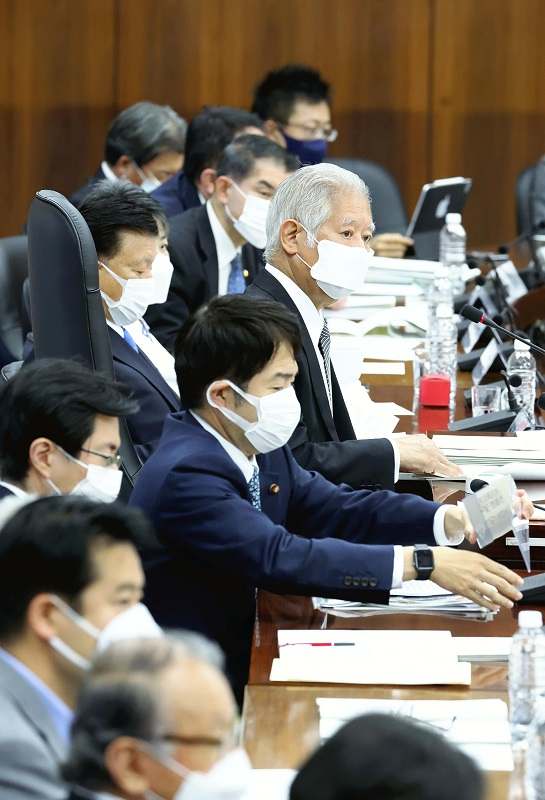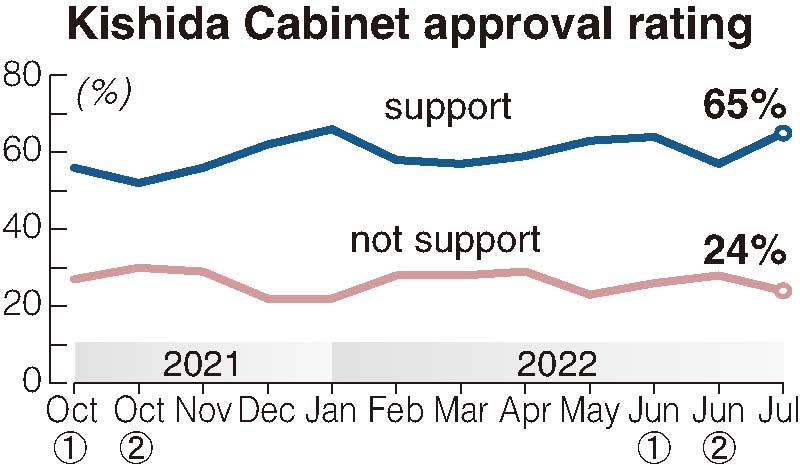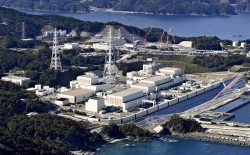
The House of Representatives Commission on the Constitution discuss issues related to Article 9 of the Constitution at the Diet in May.
17:12 JST, July 13, 2022
A nationwide poll by The Yomiuri Shimbun found that more than 70% of respondents were concerned that violence threatens Japan’s democracy in the wake of the fatal shooting of former Prime Minister Shinzo Abe.
According to the survey conducted on Monday and Tuesday, 73% of respondents said they felt that violence poses a threat to Japanese democracy while 24% of respondents said they did not feel so.
A total of 86% of respondents thought the incident on Friday affected the results of Sunday’s House of Councillors election, with 32% saying the election results were greatly affected and 54% saying they were somewhat affected.
Meanwhile, 11% said there was not much effect, and 2% said the incident did not affect the election results at all.
The approval rating for the Cabinet of Prime Minister Fumio Kishida was 65%, up 8 percentage points from the 57% rating in the previous survey conducted on June 22-23 after the election was officially announced.
The latest approval rating also marks a recovery to just above the 64% seen in the survey before that, conducted on June 3-5.
The high approval rating is believed to have been driven by people’s awareness of the need for political stability amid the worsening security environment surrounding Japan, the increasing number of novel coronavirus cases and the shooting of Abe, among other factors that are causing growing anxiety.
As for the election results, 60% of respondents thought the results were “good,” exceeding the 29% who thought the results were “not good.”
The ruling coalition of the Liberal Democratic Party and Komeito won a landslide victory in the House of Councillors election, winning 76 seats, far exceeding the line for a majority of the 125 seats up for election.
While 87% of ruling party supporters said the results were “good,” 68% of opposition party supporters said they were “not good.”
Opinions were split among independent voters, with 39% saying the results were “good” and 36% “not good.”
Regarding the government’s response to the coronavirus, 64% of respondents said they highly evaluate it, up 1 percentage point from the previous survey, while 31% said they did not highly evaluate it, the same as the previous survey.
About resuming the operation of nuclear power plants that meet regulatory standards, 54% of respondents were in favor of resumption, while 37% said they were opposed.
When asked which party they supported, 44% chose the LDP, up from 37% in the previous survey, followed by Nippon Ishin no Kai (Japan Innovation Party) at 8%, up from 6%, and the Constitutional Democratic Party of Japan at 6%, the same as the previous survey.
The Sanseito party, which gained a seat for the first time in the upper house election, was chosen by 2%.
Independent voters accounted for 25%, down from 35% in the previous survey.
When asked how long the respondents wanted Kishida to remain prime minister, a total of 79% said they wanted him to remain in office for at least two years — with 52% saying “until September 2024,” when his current term as LDP president expires, and 27% saying “as long as possible.”
Respondents who answered “about one year” accounted for 12%, while 6% said they want the prime minister to be replaced immediately.
By party, a total of 69% of opposition party supporters said they want him to remain in office, with 59% saying “until September 2024” and 10% saying “as long as possible.”
Nearly 90% of ruling party supporters want him to remain in office for at least two years, a view shared by 70% of independent voters.
The survey was conducted using a random digit dialing method on Monday and Tuesday. Valid answers were given by a total of 1,109 eligible voters.

58% hope for talks on Constitution
As for revising the Constitution, 58% said they hoped the Diet will engage in active debate on it while 37% said they did not hope so.
Those who were in favor of the constitutional revision discussions accounted for 65% of ruling party supporters, 57% of opposition party supporters and 50% of independent voters.
After the election, the ruling parties and other political forces supportive of constitutional amendment, such as Nippon Ishin no Kai and the Democratic Party for the People, retained a total of at least two-thirds of the upper house seats — the minimum needed for the Diet to initiate changes to the Constitution.
Kishida also expressed his intention to propose constitutional revision to the Diet at an early date.
With regard to issues that respondents want the Kishida Cabinet to prioritize, with multiple answers allowed, 91% selected “economy and employment,” followed by “measures to prevent high prices” at 80%, “diplomacy and security” at 76%, and “social security issues including pensions” at 73%. The rate of those who chose “constitutional revision” stood at 37%, the lowest among 10 choices.
Top Articles in Politics
-

Japan PM Takaichi’s Cabinet Resigns en Masse
-

Sanae Takaichi Elected 105th Prime Minister of Japan; Keeps All Cabinet Appointees from Previous Term
-

Japan’s Govt to Submit Road Map for Growth Strategy in March, PM Takaichi to Announce in Upcoming Policy Speech
-

LDP Wins Historic Landslide Victory
-

LDP Wins Landslide Victory, Secures Single-party Majority; Ruling Coalition with JIP Poised to Secure Over 300 seats (UPDATE 1)
JN ACCESS RANKING
-

Japan PM Takaichi’s Cabinet Resigns en Masse
-

Japan Institute to Use Domestic Commercial Optical Lattice Clock to Set Japan Standard Time
-

Israeli Ambassador to Japan Speaks about Japan’s Role in the Reconstruction of Gaza
-

Man Infected with Measles Reportedly Dined at Restaurant in Tokyo Station
-

Man Infected with Measles May Have Come in Contact with Many People in Tokyo, Went to Store, Restaurant Around When Symptoms Emerged





















